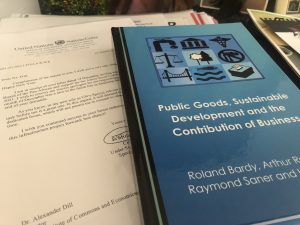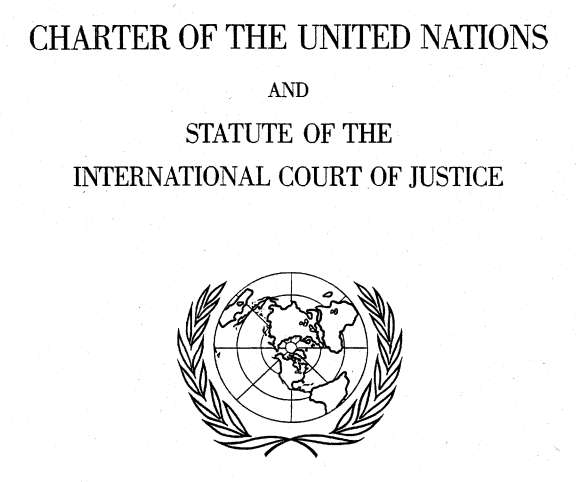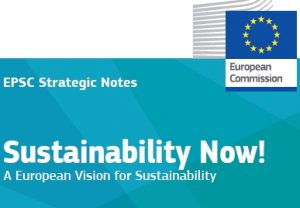How Sustainability got lost in Translation
A new book describes decades of attempts to bring about a change of consciousness
by Alexander Dill
If Immanuel Kant’s (1724-1804) categorical imperative – act as if your own law became law for all – had entered our common sense – we would not have needed the UN Charter in 1945.
In addition, neither today, we would have to discuss sustainability or public goods that are a logical consequence of self-interest in times of Global interaction. Global warming, loss of biodiversity, wars on commodities and natural capital – the biggest challenges are directly connected with the spirit we use to address them.
Unfortunately, lawmakers and CSR managers do not know Immanuel Kant – and nor do they take their time to assess what buzzwords such as sustainability and public goods are about.
Now Roland Bardy, a retired Manager of BASF, together with three Senior Experts, Arthur Rubens, Raymond Saner and Lichia Yiu, reconstruct decades of approaches on sustainability and public goods in a hardcover print version of 330 pages, available for 67 British Pounds at Cambridge Scholars Publishing, lying in front of me.
In times of spreading information through blogs and PDF, the book reminds us of how education and information once were spread: physically, and after reading proudly presented in the private library.

Between UN Correspondance a rare hardcover book on public goods and sustainable development that I will review here
While public goods and sustainability are concepts driven by experts and scientists including Nobel laureates such as Joseph Stiglitz, the “Contribution of Business” (Title of the book) to these concepts requires translation.
Generations of experts tried to translate sustainability and public goods for the behaviorist brains of lawmakers and businessmen.
Karl Falkenberg, at the time (2015) Director of the EU Division on Environment, published a compelling call to his fellow EU bureaucrats. The title “Sustainability Now!” made them throwing the 30-pages-rare-example of a good translation of sustainability in political and economic action immediately in the waste bag. They even removed his paper from the Commission’s website.
On page 74 of our book, the authors admit: “Achieving economic goals is always accompanied by that of social goals.”
Kant would say: “No, economic goals are social goals yet.”
Nevertheless, the divide of ‘economic’ and ‘social’ thinking is a societal reality that drives the discussions on how public goods should deliver to overcome Global crises such as the financial crisis of 2008 or the Corona Pandemia in 2020.
The authors feature dozens of approaches to measuring the impact and the value of the commons, of social and public goods ‘beyond GDP’. All these approaches were published in recommended journals as well as by the World Bank, the UN, and other global institutions.

Instead of complying with useless tax rules – what about complying with your fellas Davos Manifesto?
The most recent, the Davos Manifesto (p. 132) of the World Economic Forum from 2020, is part of the book yet. In the conclusion on page 242 the authors even mention the recent COVID-19 crisis, which they see as a catalyst to improve resilience by public goods.
So if such joint intelligence of Nobel laureates, leading scholars, and Global business leaders such as Klaus Schwab, such as the ESG (Environment – Social – Governance) departments of 500 MSCI companies cannot set up a working Global framework for sustainability and public goods in more than three decades – who then?
On page 132 the authors mention the appearance of Greta Thunberg in Davos 2020: “Where in past meetings, anti-capitalists were shunned from the proceedings…at this year’s meeting several of these individuals were welcomed to speak.”
The question asked by the authors is whether this is just one more of the endless accusations of claimants like Greta Thunberg or whether this will have a lasting effect on the ‘Stop Global Warming!’ commitment that already is part of the voluntary commitments by companies, governments, and IGOs.
In 1945, all countries agreed to fight no more wars. The commitment is still there. And wars still happen.
Better example: the CFC ban in 1987 has been respected by all CFC producing countries and finally led to plugging the ozone hole for a while. To mention: it was a legal ban, not a voluntary commitment.

WEF-Partners such as Lockheed Martin and BAE Systems switch to sustainable arms of mass destruction?
In general, the authors reclaim a mind change in Business towards sustainability and the support of public goods to have happened in Davos 2020. They quote Nobel laureate Milton Friedman in 1970:
“the social responsibility of business is to increase its profits” (p. 136), to demonstrate that the consciousness in Global business finally changed.
The diagram of WEF’s “Circular Economy”, introduced as a disruptive step in the Global business community, describes links to dozens of issues such as ‘the internet of things’ and ‘3D printing’, ‘Aerospace’ and ‘Global Governance’.
One link is missing: the linkage to the taxation needed to finance public goods such as health, social and environmental protection, to finance the courts that decide to which extent private wealth may replace common wealth without damaging the society.
Maybe the WEF experts believe that taxation is part of ‘Global Governance’? Tax justice still remains an entirely National subject.
So, take the Davos Manifesto for true, maybe not the mind-change, the action change is the step to do?
Credits:
The UN Charter from 1945
https://treaties.un.org/doc/publication/ctc/uncharter.pdf
Public Goods, Sustainable Development and the Contribution of Business, by Roland Bardy, Arthur Rubens, Raymond Sander and Lichia Yiu, Cambridge Scholars Publishing (Hardcover, 330 pages) , Newcastle upon Tyne, 2021
https://www.cambridgescholars.com/product/978-1-5275-6310-0
Sustainability Now! A European Vision for Sustainability, by Karl Falkenberg, European Commission, European Political Strategy Center, July 2016*
http://commons.ch/wp-content/uploads/Falkenberg_Report_July_2016.pdf
*I swear to have never met any employee of the EU having read this.
Kommentare deaktiviert für How Sustainability got lost in Translation
admin am 11. März 2021 in Allgemein







